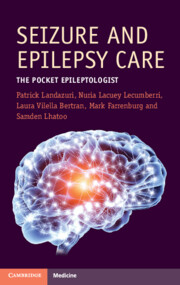Book contents
- Seizure and Epilepsy Care
- Seizure and Epilepsy Care
- Copyright page
- Contents
- 1 How Do I Evaluate a First-Time Seizure?
- 2 How Do I Make an Epilepsy Diagnosis?
- 3 Which Antiseizure Medicines Treat Epilepsy and How Do I Pick?
- 4 How Can I Best Use EEG for Treating Epilepsy Patients?
- 5 What Are Common Epilepsy Imaging Findings in New Onset and Chronic Epilepsy Care?
- 6 How Do I Care for Patients in the Emergency Department and Inpatient Settings?
- 7 How Do I Manage Epilepsy Emergencies Like Status Epilepticus?
- 8 What Is the Best Long-Term Treatment Plan for Epilepsy Patients as an Outpatient?
- 9 What to Do When Your Patient Fails Two Antiseizure Medicines
- 10 Nonepileptic Events and General Psychiatric Care for Epilepsy Patients
- 11 What Are Essential Pediatric Epilepsy Clinical Diagnoses and Treatment Plans?
- Index
- References
10 - Nonepileptic Events and General Psychiatric Care for Epilepsy Patients
Published online by Cambridge University Press: 28 January 2023
- Seizure and Epilepsy Care
- Seizure and Epilepsy Care
- Copyright page
- Contents
- 1 How Do I Evaluate a First-Time Seizure?
- 2 How Do I Make an Epilepsy Diagnosis?
- 3 Which Antiseizure Medicines Treat Epilepsy and How Do I Pick?
- 4 How Can I Best Use EEG for Treating Epilepsy Patients?
- 5 What Are Common Epilepsy Imaging Findings in New Onset and Chronic Epilepsy Care?
- 6 How Do I Care for Patients in the Emergency Department and Inpatient Settings?
- 7 How Do I Manage Epilepsy Emergencies Like Status Epilepticus?
- 8 What Is the Best Long-Term Treatment Plan for Epilepsy Patients as an Outpatient?
- 9 What to Do When Your Patient Fails Two Antiseizure Medicines
- 10 Nonepileptic Events and General Psychiatric Care for Epilepsy Patients
- 11 What Are Essential Pediatric Epilepsy Clinical Diagnoses and Treatment Plans?
- Index
- References
Summary
Epilepsy care often intersects with mental health care. The chapter begins with nonepileptic events.This commonly encountered diagnosis is frequently on the differential for people with new onset seizures. Prompt recognition of a nonepileptic diagnosis can lead to early evidence-based treatment with cognitive behavioral therapy. Moreover, a nonepileptic event diagnosis can avoid inappropriate treatments such as antiseizure medicines (ASMs). It is critical to understand a nonepileptic event diagnosis does not mean that the events are not real or the patient is faking. Specific diagnostic clues for nonepileptic events are thoroughly discussed. The other section of the chapter explores the management of comorbid psychiatric diagnoses in patients with epilepsy and nonepileptic events. The use of most psychiatric medications, including stimulants, can be considered without affecting an epilepsy patient’s treatment plan. An understanding of psychiatric medication and ASM interaction can guide drug selection. As psychiatric diagnoses negatively affect epilepsy patients’ quality of life, prompt recognition and compassionate care can improve your patient’s overall health care.
- Type
- Chapter
- Information
- Seizure and Epilepsy CareThe Pocket Epileptologist, pp. 175 - 185Publisher: Cambridge University PressPrint publication year: 2023

